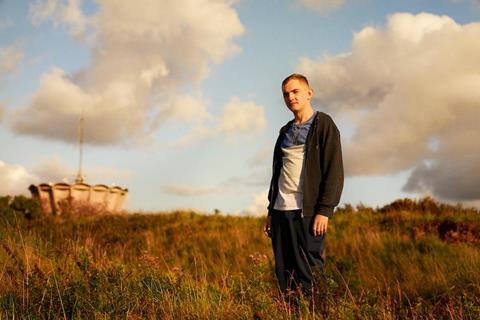Brendan Canty’s debut is an extension of his short film and opens Berlin’s Generation 14plus

Dir. Brendan Canty. Ireland/UK, 2025. 96 mins
The presence of Chris Walley in the cast is a sign we are entering Cork, Ireland’s second city and home to The Young Offenders. A tendency to break into rap also brings to mind Kneecap and, indeed Christy is subtitled too, even though the dialogue is in English. Shellsuits are rampant. But this is a touching story of foster care, responsibility and camaraderie amongst young people scratching their livings on the margins which adopts their resilient perspective. Opening the Berlinale’s youth-focused Gen 14plus, this feature-length version of Brendan Canty’s 2019 short film is a nicely-judged, empathetic, modest calling card from the young Irish director and his fresh-faced cast, and follows on from last year’s similarly-themed Kathleen Is Here.
At its strongest in its depiction of two boys who lost everything and trust nothing
Irish social realist drama in the vein of Kathleen, Rosie or Herself does tend to focus on the nation’s capital, Dublin, and its environs. Christy’s setting in the deprived suburb of Knocknaheeny in Cork’s Northside means it’s a rare exposure to the Cork vernacular, in which all sentences end with the word ‘boy’. It’s a bare-bones affair visually, not helped by the fact that it seems to be perpetually raining – but a cast of colourful residents are on hand to deliver some cheer. The last Irish film to take this slot at Berlin, The Quiet Girl, went on to an Oscar nomination; it was also about child care and adapted from a novella called ‘Foster’. Canty’s work, mentored by EP Yann Demange, takes a different tack, effectively removing the adults from the story of ’lost boys’ 17 year-old Christy (Daniel Power) and his older half-brother Shane (Diarmaid Noyes).
Hair-trigger-tempered Christy is about to age out of care in a few weeks, but has put his fist in a comfortable foster situation and landed in Shane’s reluctant and temporary guardianship. Now Shane, a painter-decorator and new young father, has to deal with the problem he has clearly spent his life overcoming – the death of their mother, and its fallout. Shane, as tightly-wound as his sibling, doesn’t want Christy to blow up his own tentative hold on a family life with wife Stacey (Emma Willis).
Christy’s anger cloaks a vulnerable boy of few words, who tentatively strikes up some friendships with neighbourhood misfit kids and his mum’s old friend (Helen Behan). A run-in with his cousin’s family opens some wounds for Shane and unanswered questions for Christy, who has lived a life separate to any biological family since the age of five as his brother fought to get away from their circumstances. But Christy doesn’t know what they were. The pressures lead to a plot structure which holds no surprises, but Canty fills the predictability with personalities. A squad of kids building a bonfire and led by Robot (Jamie Forde) will be the ones who come to rescue Christy, and Christy, by the end credits.
Canty’s film is at its strongest, and most authentic, in its depiction of two boys who lost everything and trust nothing, not even each other. It tends to meander, though, in other parts. Christy has an encounter with a homeless drug addict briefly played by Saltburn’s Alison Oliver; her character could be completely excised from the film without any repercussions (Oliver hails from Cork, which might explain it). Chris Walley similarly disappears into thin air. The constant drizzle and downbeat look, not to mention Christy’s clench-faced scowl as he drags on a joint and shuffles angrily around a broken-down estate, can make this feel like yet another hug-a-hoodie drama as the viewer is hectored into not trusting appearances.
Colm Hogan’s camera, though, takes the lead from the cast in finding spark and promise. The relationship between Christy, Shane and Stacey is crucial to the film’s success. In as much as Christy needs to trust in himself, Shane has to relax and find confidence in his own future if he is ever going to help his brother – or himself. The perspective of the terrified young carer is not one that’s usually given the respect that it is here. But two lovely central performances, from Power and Noyes help bring it home.
Production companies: Wayward Films, Sleeper Films
International sales: Charades sales@charades.eu
Producers: Martina Brackenbury, Meredith Duff, Rory Gilmartin
Screenplay: Alan O’Gorman
Cinematography: Colm Hogan
Production design: Martin Goulding
Editing: Allyn Quigley
Music: Daithi O’Dronai
Main cast: Daniel Power, Diarmaid Noyes, Emma Willis, Alison Oliver, Helen Behan, Chris Walley
























